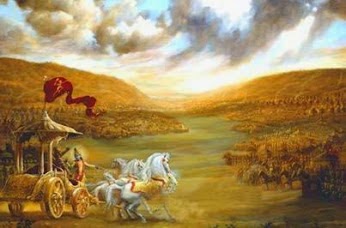Srimad Bhagavad - Gita: Gita : Ch-2. Slo-3.
Srimad Bhagavad - Gita: Gita : Ch-2. Slo-3. : Srimad Bhagavad-Gita : Chapter-2. ( Samkya-yogam ) Slokam-3. ( O son of Prtha, do not yield to this degrading impotence. It doe...
Srimad Bhagavad-Gita : a part epic Mahabharatham . Spread in 18 chapters and 700 slokams and situated in ( 6)Bhishma-Parvam of Mahabharatham,(18) chapters 25 to 42. The whole Gita is a conversation between Arjuna and Lord Krishna on various subjects, clearing all doubts. We are all Arjunas and Lord is here as our Guru, We must study this "Tattva-Sastram"and follow in our daily life. We must realise Lord within us and not in temples only.












